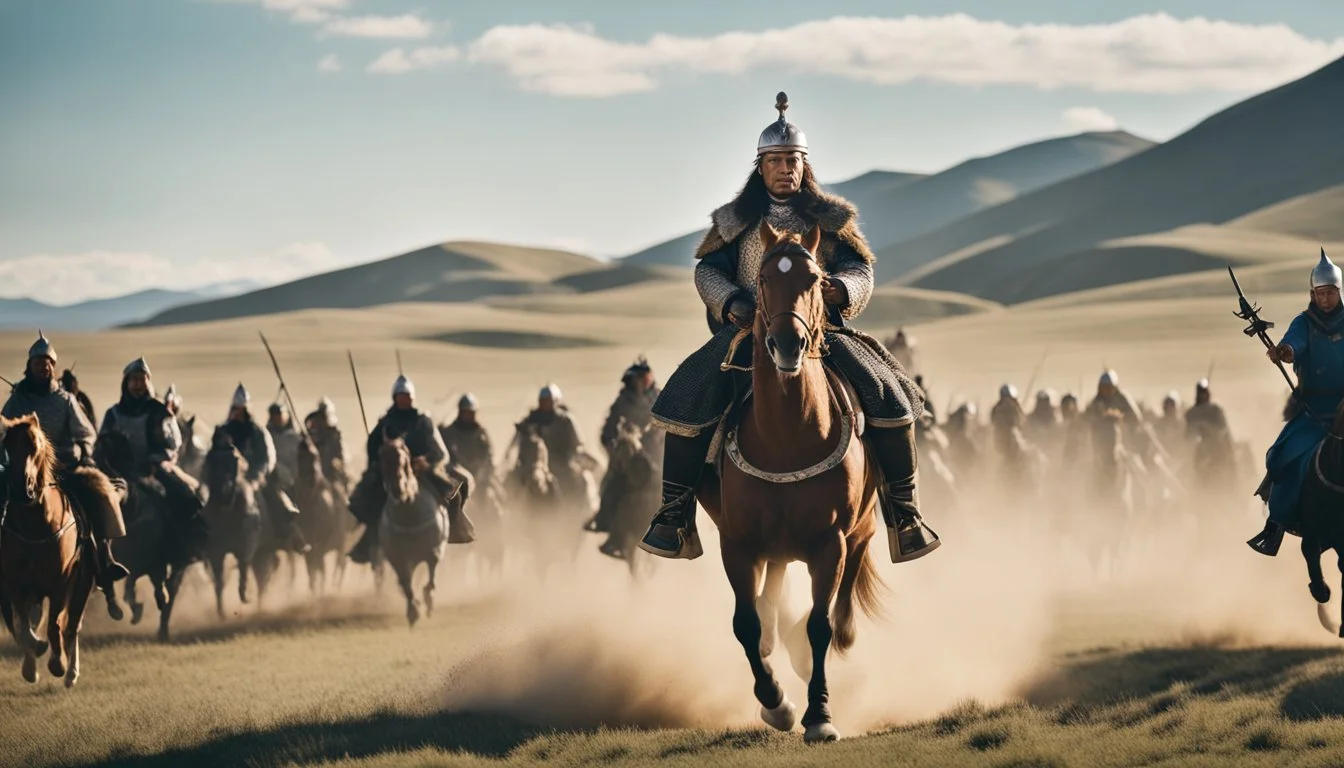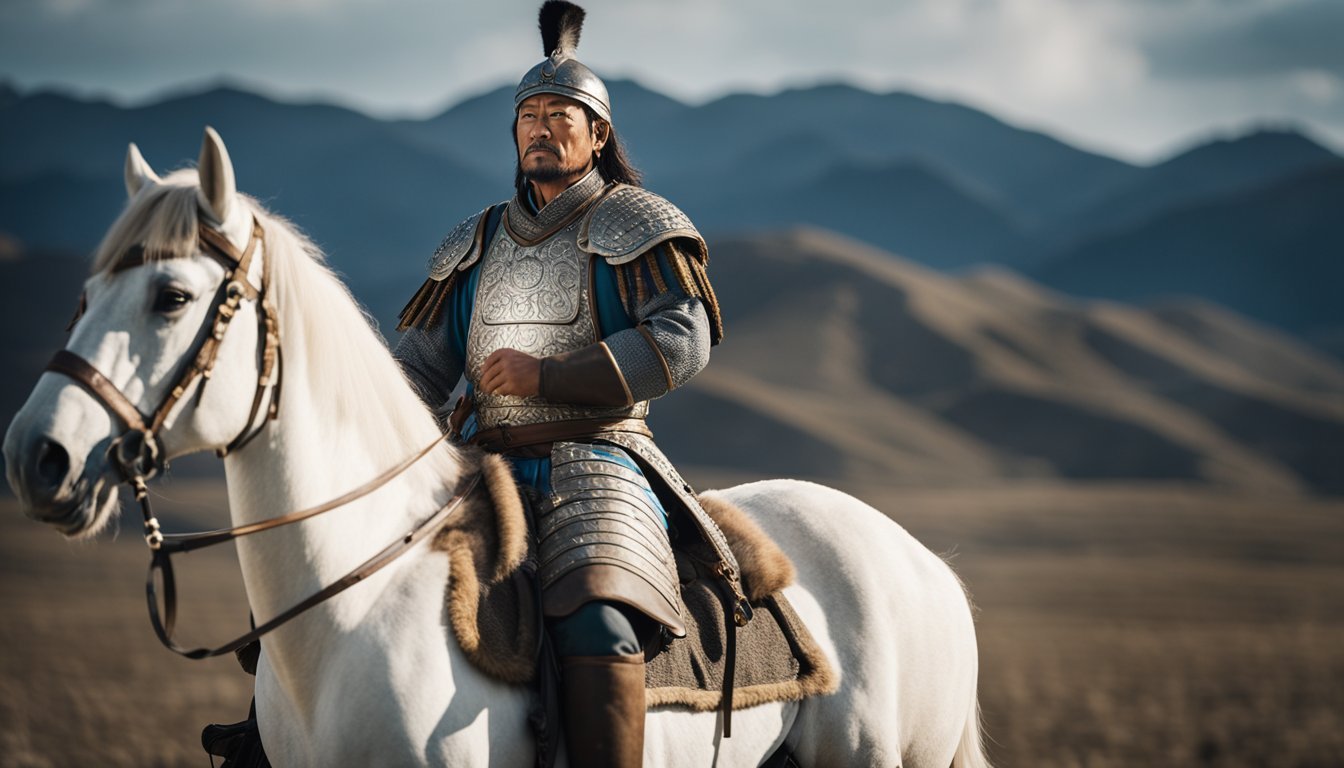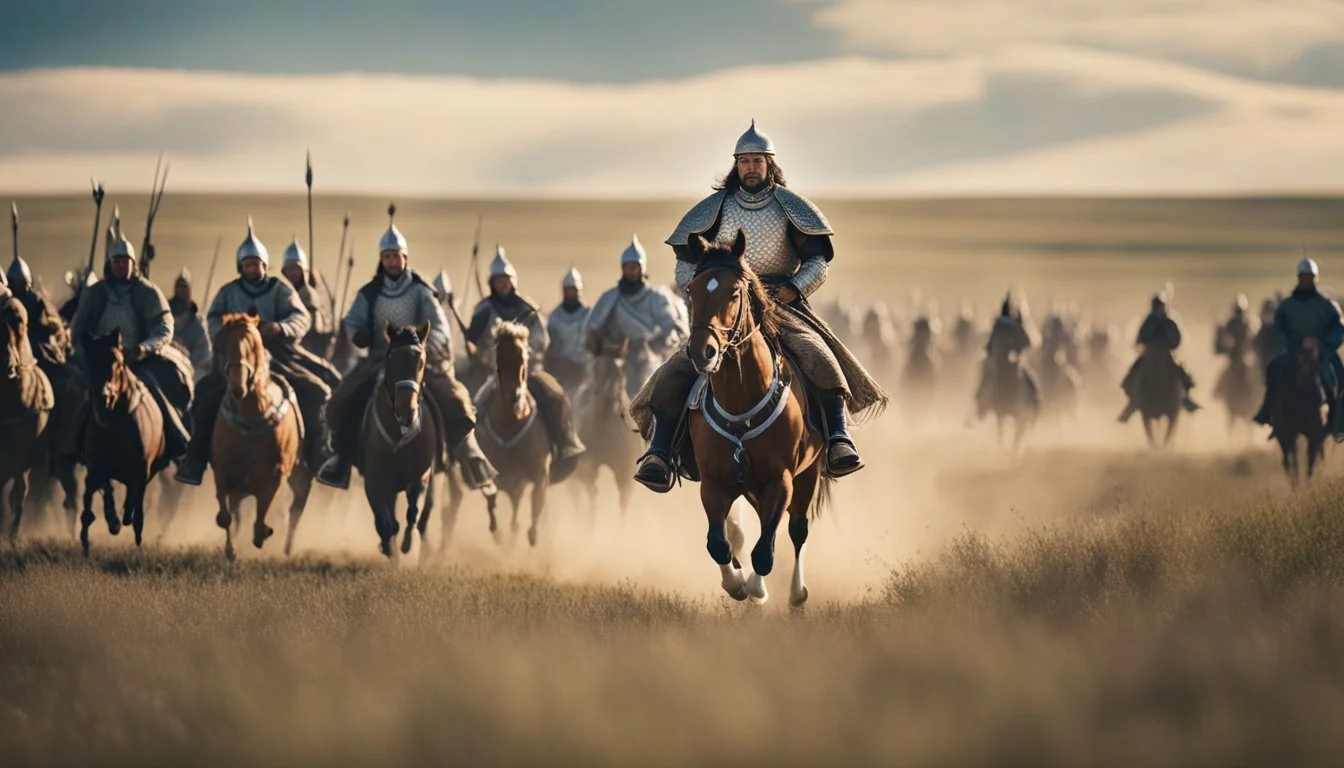7 Documentaries about Genghis Khan
Discover the Legend
Genghis Khan, the legendary founder of the Mongol Empire, has fascinated historians and enthusiasts for centuries. His life and conquests have left an indelible mark on history, making him a subject of many documentaries that strive to shed light on his complex character and the vast empire he built.
For those interested in understanding the historical and cultural impact of Genghis Khan, these documentaries provide valuable insights and vivid portrayals of his life and legacy. From his humble beginnings to his rise as one of history's most formidable and influential leaders, each documentary offers a unique perspective on the man behind the legend.
1) Mongol: The Rise of Genghis Khan (2007)
"Mongol: The Rise of Genghis Khan" is a period epic film directed by Sergei Bodrov. The film captures the early life of Temüjin, later known as Genghis Khan.
The storyline focuses on his transformation from a slave to a powerful conqueror. The character's journey showcases his strategic brilliance and resilience.
Starring Tadanobu Asano, Honglei Sun, and Khulan Chuluun, the film brings historical figures to life with compelling performances and impressive visuals.
The narrative explores themes of loyalty, betrayal, and leadership, painting a vivid picture of the legendary leader's formative years.
For more information, visit IMDb.
2) Genghis Khan: To The Ends Of The Earth And Sea (2007)
"Genghis Khan: To The Ends Of The Earth And Sea" is a Japanese historical drama directed by Shin'ichirô Sawai. The film stars Takashi Sorimachi as the legendary Mongol leader, Genghis Khan.
The story focuses on Temujin, who later becomes known as Genghis Khan. It covers his rise from a tribal leader to the ruler of the Mongol Empire.
The film was released in Japan on March 3, 2007, and later in Hong Kong on April 26, 2007. It was notably screened at international film festivals, including Cannes and the Moscow International Film Festival.
With a blend of epic battles and personal drama, the film attempts to capture both the grandeur and intricacies of Genghis Khan's life and conquests.
For more details, visit the IMDb page.
3) The Secrets of Genghis Khan (2004)
Legend has it that Genghis Khan, the greatest warrior who ever lived, is buried in a hidden location with his plundered treasure: gold and silver from the lands of Islam, the Caliph of Baghdad's private vaults, and art and textiles from the great cities of the Middle Ages.
Join a team of explorers across the steppes of Mongolia on their adventurous quest to unearth one of history's most elusive and tantalizing mysteries.
Delve into the life and legacy of the Mongol Empire's formidable leader, uncover ancient secrets, and witness the breathtaking landscapes that have kept Genghis Khan's final resting place shrouded in mystery for centuries.
For more information, visit the IMDb page.
4) The Secret History of Genghis Khan
"The Secret History of Genghis Khan" (2006) delves into the life of one of history’s most influential figures. This BBC documentary explores his rise from humble beginnings to a commanding ruler. It highlights the significant impacts he had on the ancient world.
The documentary is notable for its reliance on "The Secret History of the Mongols," a historic text written nearly 800 years ago. This text, authored by Genghis Khan’s adopted son, offers a unique perspective on his life and conquests.
This documentary sheds light on lesser-known aspects of Genghis Khan’s life and dispels many myths surrounding his legacy. It underscores the fascinating contrast between his perceived brutality and his sophisticated strategies in uniting the Mongol tribes.
Michael Praed, an experienced narrator, brings the story to life with engaging storytelling. This documentary is a must-watch for anyone seeking a deeper understanding of Genghis Khan’s extensive influence on world history.
For more information, you can visit the IMDb page of the documentary.
5) Genghis Khan: The Legend of the Ten (2012)
"Genghis Khan: The Legend of the Ten" is a 2012 epic action film directed by Zolbayar Dorj and U. Shagdarsuren. The movie focuses on the brave warriors from Genghis Khan's Aravt crew, who embark on a perilous mission in the woods.
The crew of Mongol warriors faces life-threatening challenges as they navigate their dangerous mission. Known for its focus on Genghis Khan's legacy, the film showcases the relentless determination and unity of the Mongol warriors.
Featuring actors such as T. Altanshagai, B. Amarcanihan, and C. Ariunbyamba, this Mongolian-language film brings the intense loyalty and courage of Genghis Khan’s warriors vividly to life. The storyline captures the essence of what made Genghis Khan a legendary figure in history.
This film provides a dramatic glimpse into the harsh realities and sacrifices of Genghis Khan's time. English subtitles make it accessible to a wider audience, allowing viewers to experience the historical and cultural context in which these warriors operated.
For more information on "Genghis Khan: The Legend of the Ten," visit IMDb.
6) Genghis Khan: Rise of the Conqueror (2007)
"Genghis Khan: Rise of the Conqueror" explores the life and achievements of one of history’s most powerful leaders. This documentary details the early struggles and successes of Genghis Khan, from his humble beginnings to his establishment of the Mongol Empire.
Using a mix of historical accounts and dramatic re-enactments, the film highlights the strategic genius and leadership skills that enabled Genghis Khan to unite various nomadic tribes. It also delves into the tactical innovations he introduced, which played a crucial role in his military conquests.
The narrative in the documentary provides a detailed look at how Genghis Khan managed to control and expand an empire that became the largest contiguous land empire in history. It emphasizes his ability to adapt and overcome challenges while bringing various cultures and territories under a single rule.
For a deeper exploration of his life and impact, viewers can find additional information on Amazon. (2007)
7) National Geographic: Forbidden Tomb of Genghis Khan
National Geographic explores the life and legacy of Genghis Khan through stunning visuals and expert interviews. This documentary delves into the history of the Mongol Empire, which Genghis Khan established.
The documentary covers key moments of his reign, including his military conquests and the unification of Mongolian tribes. It also ventures into the cultural influences the Mongol Empire had on the world.
Viewers get a chance to see archaeological discoveries, such as tombs and artifacts, brought to life with high-quality cinematography. This adds a layer of authenticity and depth to the storytelling.
For more information, visit National Geographic Documentary on Genghis Khan.
Historical Background of Genghis Khan
Genghis Khan, born as Temujin, transformed from a tribal outcast into one of history's greatest conquerors. His life story includes struggles for power, innovative military tactics, and profound impacts on the culture and politics of his empire.
Early Life and Rise to Power
Temujin was born around 1162 in the Mongolian steppes. His early years were marked by hardship as his father was poisoned, leaving his family vulnerable. Temujin faced kidnapping, slavery, and clan rejections. Despite these setbacks, he displayed remarkable leadership qualities. Through strategic alliances and sheer determination, he began to unite the Mongol tribes under his leadership. By 1206, he was proclaimed Genghis Khan, meaning "universal ruler," after successfully uniting the tribes.
Military Strategies and Conquests
Genghis Khan's military genius lay in his use of speed, mobility, and psychological warfare. He organized his army into units based on the decimal system, ensuring efficient command and control. His tactics included feigned retreats, surprise attacks, and intelligence gathering. Genghis Khan's forces were adept horsemen, enabling rapid movements across vast territories. He conquered much of Asia, including parts of China, Persia, and Central Asia, creating one of the largest contiguous empires in history.
Cultural and Political Impact
Beyond his conquests, Genghis Khan's influence extended into the cultural and political realms. He implemented a meritocratic system within his empire, promoting individuals based on ability rather than birthright. This approach fostered loyalty and efficiency. He also established the Yassa, a code of laws that helped maintain order across diverse populations. Genghis Khan encouraged trade and communication along the Silk Road, enhancing cultural exchanges between East and West. His legacy continued through his descendants, notably Kublai Khan, who further expanded the Mongol Empire.
Impact on Modern Perspectives
Genghis Khan's influence extends into various aspects of contemporary society, ranging from popular culture representations to refined historical interpretations, and the lasting heritage in Mongolia today.
Genghis Khan in Popular Culture
Genghis Khan has frequently appeared in films, books, and television shows, shaping public perception. Documentaries like Echoes of the Empire: Beyond Genghis Khan offer detailed insights into his life and legacy. These works present him not merely as a conqueror but as a statesman and reformer.
A notable aspect is the portrayal of his military genius and governance skills. Movies and series often highlight his strategies and the expansive empire he built. This portrayal affects how modern audiences view historical leadership and empire-building.
Pop culture sometimes oversimplifies or exaggerates his life story, focusing on dramatic conquests. Yet, these representations also foster a growing interest in Mongol history, encouraging viewers to explore academic sources for a more balanced view.
Modern Historical Interpretations
Recent scholarship has reassessed Genghis Khan's role in world history. Historians now emphasize his contributions beyond conquests, such as promoting trade, diplomacy, and legal systems. Jack Weatherford’s book, Genghis Khan and the Making of the Modern World, argues that his governance laid the groundwork for modern statehood dynamics.
Historians note his empire's role in creating safer and more expansive trade routes, notably the Silk Road, which facilitated cultural and economic exchange between East and West. This interpretation contrasts sharply with earlier views that painted him solely as a brutal conqueror.
Scholars also highlight his progressive policies, such as religious tolerance and merit-based promotion, which were advanced for his time. These perspectives help in understanding the complexities of his leadership and its long-term impacts.
Legacy in Contemporary Mongolia
In Mongolia, Genghis Khan remains a national hero. His image and name are omnipresent, found on everything from currency to commercial products. Significant national monuments and statues commemorate his legacy, embodying national pride and historical continuity.
Academic and cultural institutions in Mongolia focus on preserving and studying his heritage. Museums and research centers conduct extensive work on the Mongol Empire, promoting a nuanced view of Genghis Khan's rule.
Modern Mongolia's identity heavily ties to his legacy, influencing political discourse, cultural practices, and educational curricula. This reverence ensures his influence endures, affecting not only how Mongolians view their past but also how they engage with the broader world.




